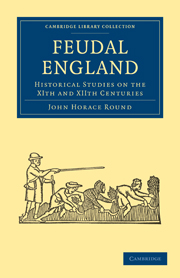Book contents
- Frontmatter
- Preface
- Contents
- PART I TERRITORIAL STUDIES
- PART II HISTORICAL STUDIES
- NORMANS UNDER EDWARD THE CONFESSOR
- MR. FREEMAN AND THE BATTLE OF HASTINGS
- MASTER WACE
- NOTE ON THE PSEUDO-INGULF
- REGENBALD, PRIEST AND CHANCELLOR
- THE CONQUEROR AT EXETER
- THE ALLEGED DESTRUCTION OF LEICESTER (1068)
- ELY AND HER DESPOILERS (1072–75)
- THE LORDS OF ARDRES
- EARLY IRISH TRADE WITH CHESTER AND ROUEN
- WALTER TIREL AND HIS WIFE
- WALDRIC, WARRIOR AND CHANCELLOR
- A CHARTER OF HENRY I. (1123)
- THE ORIGIN OF THE NEVILLES
- THE ALLEGED INVASION OF ENGLAND IN 1147
- THE ALLEGED DEBATE ON DANEGELD (1163)
- A GLIMPSE OF THE YOUNG KING'S COURT (1170)
- THE FIRST KNOWN FINE (1175)
- THE MONTMORENCY IMPOSTURE
- THE OXFORD DEBATE ON FOREIGN SERVICE (1197)
- RICHARD THE FIRSTS CHANGE OF SEAL (1198)
- COMMUNAL HOUSE DEMOLITION
- THE CINQUE PORT CHARTERS
- ADDENDA
- INDEX
REGENBALD, PRIEST AND CHANCELLOR
Published online by Cambridge University Press: 05 October 2010
- Frontmatter
- Preface
- Contents
- PART I TERRITORIAL STUDIES
- PART II HISTORICAL STUDIES
- NORMANS UNDER EDWARD THE CONFESSOR
- MR. FREEMAN AND THE BATTLE OF HASTINGS
- MASTER WACE
- NOTE ON THE PSEUDO-INGULF
- REGENBALD, PRIEST AND CHANCELLOR
- THE CONQUEROR AT EXETER
- THE ALLEGED DESTRUCTION OF LEICESTER (1068)
- ELY AND HER DESPOILERS (1072–75)
- THE LORDS OF ARDRES
- EARLY IRISH TRADE WITH CHESTER AND ROUEN
- WALTER TIREL AND HIS WIFE
- WALDRIC, WARRIOR AND CHANCELLOR
- A CHARTER OF HENRY I. (1123)
- THE ORIGIN OF THE NEVILLES
- THE ALLEGED INVASION OF ENGLAND IN 1147
- THE ALLEGED DEBATE ON DANEGELD (1163)
- A GLIMPSE OF THE YOUNG KING'S COURT (1170)
- THE FIRST KNOWN FINE (1175)
- THE MONTMORENCY IMPOSTURE
- THE OXFORD DEBATE ON FOREIGN SERVICE (1197)
- RICHARD THE FIRSTS CHANGE OF SEAL (1198)
- COMMUNAL HOUSE DEMOLITION
- THE CINQUE PORT CHARTERS
- ADDENDA
- INDEX
Summary
NO better illustration could be given of the fact that valuable historical evidence may lurk, even in print, unknown, than the charters printed, from the Cirencester Cartulary, by Sir Thomas Phillips in Archœologia (1836). One can imagine how highly prized they would have been by Mr. Freeman, had he only known of their existence.
Regenbald, of whom Sir Thomas would seem never to have heard, was the first chancellor of England. Mr. Freeman called him, I know not on what authority, “the Norman chancellor of Eadward.” Whatever his nationality, it is well established that he was that king's chancellor. He occurs repeatedly in Domesday, where he is distinguished as “Canceler,” “Presbyter,” and “de Cirencestre.” We learn also from its pages that he held land in at least three counties–Berkshire, Herefordshire, and Dorset T.R.E., and that he seems to have received further grants from King William in his turn.
The three charters of which I treat are found in the Cirencester Cartulary and are in Anglo-Saxon. The first is one of King Edward's in favour of “Reinbold min preost,” and is a confirmation to him of soc and sac, toll and team, etc., as his predecessors had enjoyed it “on Cnutes kinges daie.” The third is a notification from King William that “ic hæbbe geunnen Regenbald minan preoste eall his lond” as “he hit under Edpearde hædde mine meie.”
- Type
- Chapter
- Information
- Feudal EnglandHistorical Studies on the XIth and XIIth Centuries, pp. 421 - 430Publisher: Cambridge University PressPrint publication year: 2010First published in: 1895



